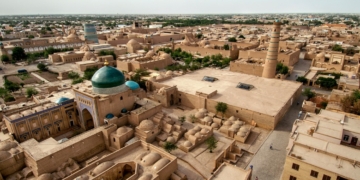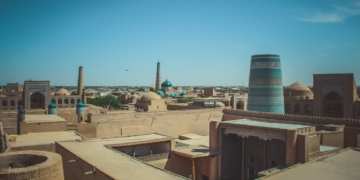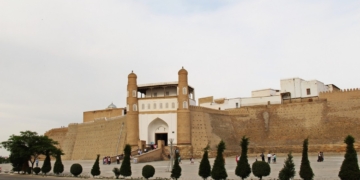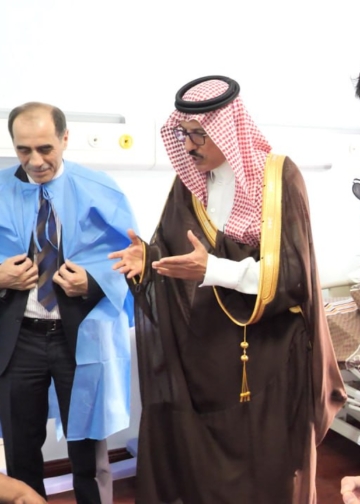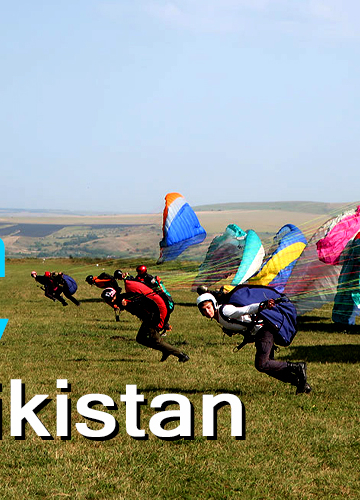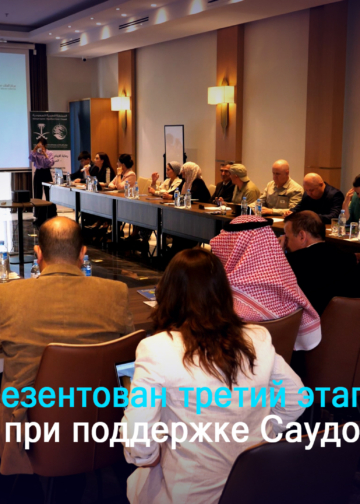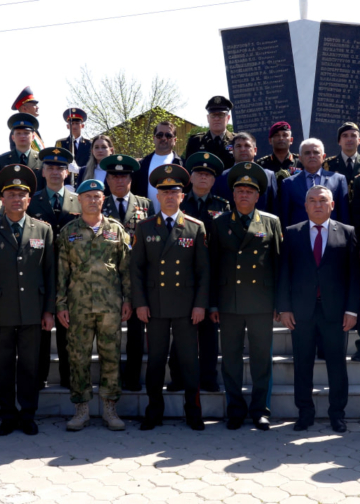Статья Министра иностранных дел Республики Беларусь Владимира Макея в
издании «The Journal of International Affairs” (США, Нью-Йорк), на английском
языке
Статья Министра
иностранных дел Республики Беларусь Владимира Макеяпод названием «Торговля людьми в период после окончания «холодной» войны: к
всеобъемлющему подходу»в американском внешнеполитическом
издании«The Journal of International Affairs»посвящена анализу процесса эволюции усилий международного
сообщества по борьбе с торговлей людьми со времени окончания «холодной» войны.
Автор статьи описывает характерные для этого периода тенденции и действия в
контексте противодействия торговле людьми, которые в целом позволили международному
сообществу постепенно двигаться к более целенаправленным и всеобъемлющим
усилиям в этой области. Статья акцентирует внимание на центральной роли
инициированных Беларусью резолюций Генеральной Ассамблеи ООН, Глобального плана
действий по борьбе с торговлей людьми, принятого Генассамблеей ООН в июле 2010
г., а также заседания высокого уровня по оценке хода реализации Глобального
плана, запланированного на 13 мая 2013 г. Факт публикации статьи известным
американским внешнеполитическим изданием свидетельствует об актуальности данной
темы.
Human Trafficking in the Post-Cold War Period:
Towards a Comprehensive Approach
Vladimir Makei
Trafficking in persons represents a serious
crime, although one that is not yet fully explored. Notwithstanding, what is
known about it makes one wonder how this modern-day slavery could acquire such
immense proportions. The international community has progressed a long way over
the past two decades in understanding and tackling the crime of human
trafficking. Throughout the 1990s, it was primarily viewed as, and often
confused with, illegal migration. The UN Convention against Transnational
Organized Crime with its Protocols adopted in 2000 successfully addressed this
distinction and inaugurated a specific approach to fighting trafficking in
persons. Yet, as the levels of trafficking continued to rise, that paradigm
developed in the 2000 convention and protocols was increasingly questioned. The
2008 Vienna Forum to Fight Human Trafficking developed momentum for a
comprehensive approach against the crime. This effort led to the adoption—by
the UN General Assembly—of the Global Plan of Action to Combat Trafficking in
Persons in 2010.
01/29/2013
Contemporary Human
Trafficking: Extent of the Challenge
Human trafficking has an elaborate
internationally agreed definition that is contained in the Protocol to Prevent,
Suppress and Punish Trafficking in Persons, Especially Women and Children—also
known as the Human Trafficking Protocol—that supplements the 2000 UN Convention
against Transnational Organized Crime.The very complexity of the definition would indicate that the
international community knows much about human trafficking. This, however, is
not the case. This section will explore what we really know about the issue.
Human trafficking is believed to affect all
countries in the world, though in different ways. Countries are generally
divided into three categories: origin, transit, and destination. Affluent
countries generally stand as the destination for the trafficking of individuals
that originated in poorer countries. However, both poor and affluent countries
may serve as transit states. At the same time, trafficking in persons is also
known to take place in within the borders of a country.
Various studies by international organizations
and individual states furnish statistics on numbers of trafficking victims that
significantly differ from each other. For example, the 2012 Global Estimate of
Forced Labour by the International Labour Organization (ILO) put the total
number victims at 20.9 million.[ii][iii][iv]
Breaking down human trafficking by purpose
reveals that public’s primary concern has traditionally been with the
trafficking for sexual exploitation. This form was estimated to account for the
lion’s share of total trafficking figures—up to 80 percent or more.However, recent years have seen increasing realization that the
trafficking for the purposes of labor exploitation might be far higher in
magnitude than previously thought.[vi]
In particular, the ILO makes this point clear in
its own studies. Hence, in its 2012 Global Estimate of Forced Labour, the ILO
estimates that of the total figure of 20.9 million victims, 14.2 million are
victims of forced labor exploitation—68 percent—whereas 4.5 million—22
percent—are victims of sexual exploitation. The remaining 2.2 million—10
percent—are victims of other forms of trafficking-related exploitation.[vii][viii]
In geographical context, the 2006 UNODC report
identified the following global patterns; Western Europe and North America were
the main destinations for trafficked persons, with Asia also featuring to some
extent as a destination. The regions of Eastern Europe, Latin America, Africa,
and Asia were the countries of origin for victims. With that, Asia is estimated
to generally account for more than half of all human trafficking cases—origin and
destination.[ix]
When it comes to profits, trafficking in persons
is widely viewed as the world’s third largest illegal activity after the
illegal trafficking of arms and of drugs. Incomes from human trafficking, by
some estimates, vary from $7 billion to $32 billion a year.
Human trafficking is underpinned by economic and
social causes. In economic terms, it is a by-product of globalization that is
driven by its own supply and demand logic. The later involves the demand for
sexual and labor services, which is the largest in affluent countries. The
supply, in turn, stems from poor countries, where some people are keen to
attain better life in more prosperous states. Yet, setting out in search of
happiness abroad, future victims of trafficking do not foresee that they may
fall victim to exploitation in order to satisfy the above demand.
As for the social causes, human trafficking, on
the one hand, is certainly made possible by gender biases, still prevalent in
many supply-related countries. These serve to force women and girls to look for
income abroad, thereby making them easy prey to criminals. On the other hand,
trafficking in persons would not be possible in the demand countries, if their
societies did have a degree of tolerance to human exploitation.
Nonetheless, for all that we know by now about
human trafficking, it seems that we do not know enough. In fact, the UNODC 2009
Global Report on Trafficking in Persons admits as much.
The lack of credible and sufficient data on
human trafficking can be attributed to several factors. First and foremost, we
should realize that it is a very clandestine activity, and the traffickers go
to great lengths to keep it that way. Thus, it is hardly surprising that we do
not know everything about this crime. Moreover, not all countries have enacted
appropriate human trafficking legislation that allows for effective action and
proper reporting. Indicative of this is UNODC’s finding that two out of five
countries surveyed in its 2009 report—155 countries were surveyed—failed to
report at least a single conviction related to human trafficking.
What is most worrisome is that levels of human
trafficking appear to be persistently rising. Judging by the ILO’s recent
study, the number of victims of forced labor has increased from 12.3 million in
2005 to 20.9 million in 2012.
The First Post Cold-War
Decade: Problem’s Recognition
During the Cold War, human trafficking was not
as prominent an issue. With the borders between the two ideological camps
tightly closed, there were hardly any significant flows of people between them.
For that reason, trafficking in persons was not a matter of great concern to either
of the superpowers or their respective allies. Moreover, during the period in
question, there was not much interest in transnational challenges in general,
because the world’s major players were primarily preoccupied with traditional
security issues. It is plausible and probable that trafficking occurred
elsewhere throughout the world, but it did not solicit attention or focus. What
is interesting is that the issue of human trafficking received more global
attention in the first half of the 20thcentury than in the
second. Apparently, such was the case, because the former period was
characterized by a more open international environment than the latter.
Indeed, a number of international instruments
adopted over the first three decades of the 20thcentury attest
to the world’s attention to preventing illicit human trafficking: the 1904
International Agreement for the Suppression of the White Slave Traffic, the
1910 International Convention for the Suppression of the White Slave Traffic,
the 1921 International Convention for the Suppression of the Traffic of Women
and Children, and the 1933 International Convention for the Suppression of the
Traffic in Women of Full Age.While the Cold War period did not give
substantial attention to the topic of trafficking, there were several
gender-related events that raised awareness about trafficking in general. The
proclamation of the Decade for Women in 1975 was as a catalyst of such efforts.The end of bipolar rivalry triggered the opening
of borders. Consequently, the international community came to realize the
importance of addressing transnational threats. While the opening of the
borders was one factor that enabled transnational threats, another was
associated with advances in information and communication technologies, above
all the Internet and mobile phones, which made the work for traffickers, drug
dealers, and terrorists much easier than used to be in the past. For example,
the Internet considerably helps facilitate recruitment for some activities
related to migration, such as work in model agencies, which on surface appears
to be legitimate. Yet candidates who respond to such advertisements may in fact
be misled about the true purpose of their prospective enterprise and instead
end up abroad as forced laborers.
Human trafficking in the initial post-Cold War
period was mainly viewed in the context of illegal migration, which falls
within the broader category of transnational organized crime. Indeed,
trafficking in persons and illegal migration seem to have many similarities.
What appears to unite them above all is that most future victims of trafficking
start as illegal migrants hoping for a better life abroad. But, at some point
their migration goes awry, and instead of becoming better off, they end up
being exploited. So, human trafficking may be regarded as a prevented form of
migration.
However, despite an ostensibly similar nature of
human trafficking and illegal migration, they represent two different
challenges. Such an understanding would come by the decade’s end and result in
a number of relevant international legal instruments.
Meanwhile, the realization of the need to cope
with rising transnational organized crime led to the establishment of a
specialized UN agency. Thus, in 1992 the Commission on Crime Prevention and
Criminal Justice was established with the view to implementing the UN Crime
Prevention and Criminal Justice Programme that was designed a year earlier.
Further institutional arrangements led to the establishment in 1997 of the UN
Office for Drug Control and Crime Prevention by combining the UN Drug Control
Programme and the Centre for International Crime Prevention. In 2002, that
entity was to be renamed into the UNODC.
The issue of human trafficking also received
certain degree of attention at some major international events held in the
1990s: the 1993 Vienna International Conference on Human Rights, and the 1995
Beijing International Conference on Women. They contributed to a better
understanding of the issue of human trafficking.
Overall, the 1990s can be regarded as a period
when the international community began feeling the impact of trafficking in
persons that was flourishing as result of the relatively open post-Cold War
globalization and the global environment. Nonetheless, there was no clear
understanding of the challenge at the time. It is its complex nature—which
closely linked it with other problems like illegal migration, contemporary
slavery, and violence against women—that made it difficult to grasp relevant
the nuances. Consequently, trafficking in persons was not treated as a distinct
form of crime. As a result, throughout the 1990s there was neither any specific
legislation against trafficking in persons in most countries, nor tangible
international cooperation or coordination among their law enforcement and other
relevant agencies.
The 2000 Human
Trafficking Protocol: Staking on a Security Paradigm
As the challenge of transnational organized
crime was becoming more persistent at the end of the 1990s, the international
community began treating it more comprehensively. As a result, there emerged an
understanding that illegal migration and human trafficking were not the same,
but rather stood as two separate crimes, each requiring separate analysis and
appropriate action.
Indeed, despite apparent similarities, there are
significant differences between the two types of crimes. First, illegal
migration is a clear crime against the state, the borders of which a migrant
illegally crosses. Whereas trafficking in humans is a crime against an
individual, who becomes the object of exploitation. Second, illegal migration
is about a voluntary act by an individual to cross the border of another state.
Trafficking in persons may look like a voluntary act at some stages.Such an understanding was reflected in two
separate Protocols—covering trafficking in persons and smuggling of
migrants—adopted by the UN General Assembly as part of the 2000 UN Convention
on Transnational Organized Crime—also known as the Palermo Convention and
Protocols.
With the benefit of hindsight, it could be
reasonably argued that the Human Trafficking Protocol contained both positive
and flawed elements. On a positive side, the Protocol generally inaugurated a
three-pronged approach against the crime anchored around the three
Ps—prevention, prosecution, and protection.
As well as providing guidelines for reducing
human trafficking, the Protocol furnished the international community with a clear-cut
definition of the crime of trafficking in persons. It also established specific
obligations for signatories to criminalize human trafficking, and implement a
number of other measures—such as tightening border controls, and enhancing
cooperation between law enforcement agencies.
Despite the successes of the Protocol, it can
also reasonably be held that it failed to cover all possible angles of the
crime. On the surface, the Protocol may seem to be concerned with all the three
Ps. In reality, it favors one prosecution more than prevention and protection.
The Protocol’s drafters appear to have ushered an approach that could be
described as a law and order paradigm. They created a strong law-enforcement
tool with comparatively weaker language on preventive and protective measures.
Indeed, the prosecution provisions in the Human Trafficking Protocol contain
mandatory language, such as «states parties shall,” while the protections and
assistance provisions soften the language to terms such as «in appropriate
cases” and «to the extent possible.”
As the protocol on the smuggling of
migrants—officially the Protocol against the Smuggling of Migrants by Land, Sea
and Air—was based on the same understanding, in practice it meant that the
signatories began harmonizing their legislation in line with the Protocols, and
the nexus of human trafficking and illegal migration was increasingly addressed
as a security concern rather than as an issue that spans the realms of
security, development, and human rights. This primarily served to bring about
the adoption of restrictive immigration laws and policies.
Another concern with the protocols—on
trafficking in persons and smuggling of migrants—relates to the problem of
victim identification. Since neither protocol provides guidance with regards to
identifying smuggled versus trafficked persons, their identification became the
prerogative of individual countries. This created ambiguity, because it is
often quite hard to clearly identify whether an individual is the victim of
trafficking or of illegal migration. What matters is that the outcomes from the
identification are different. If the case falls within human trafficking, the victim
is entitled to protection. If, however, the case is identified as illegal
migration, states are expected to facilitate the return of victims to the
countries of their permanent residence..
Two main factors seem to explain why the
international community opted for a law and order paradigm against trafficking
in persons. First, the Palermo Convention and Protocols were drafted by
criminal justice experts, whose primary experience involved prosecution of
crimes.The crucial question then becomes whether the
security-based paradigm to address human trafficking would yield positive
results.
The 2008 Vienna Forum:
Search for New Momentum
The Palermo Convention with its Protocols came
into effect in 2003.Naturally, the report’s findings provided a
boost to further research on, and action against, trafficking in persons. Many
countries in the UN started asking what was to be done to speed up the
implementation of the Protocol, which as of 2006 was very far from being a
universally ratified tool.The international community was thus poised to
explore ideas for enhanced international coordination on human trafficking. On
20 October 2006, the UN General Assembly adopted a Belarus-sponsored resolution
titled «Improving the coordination of efforts against trafficking in persons.”
The resolution’s key value was to empower the Inter-Agency Coordination Group
against Trafficking in Persons (ICAT), consisting of seventeen international
agencies, which was established only a month earlier at a meeting in Tokyo.
This move enabled the UN agencies involved in the fight against trafficking in
persons to organize regular exchanges of information and effective coordination
of their activities.
Likewise, the context prompted a greater
scrutiny of the Protocol itself, in particular, whether the document sufficiently
dealt with the causes of trafficking. As a result, there gradually began to
emerge a growing understanding that the Protocol, with its law and order
thrust, concerned itself more with the consequences of human trafficking than
with its causes.
Indeed, tightened border controls certainly made
it more difficult for individuals willing to illegally cross borders in search
of a better life abroad to get to a destination point. But these measures fail
to address the reasons that force people to migrate illegally. Moreover, the
law and order approach, perhaps inadvertently, might have enhanced the role of
traffickers and smugglers. Indeed, faced with the restricted legal migration
opportunities, such determined «fortune seekers” had no option but to ask the
assistance of criminal groups.
This understanding—with regard to the
Protocol—might have stood behind some regional anti-trafficking initiatives,
which attempted to cover the Protocol’s purported deficiencies. In particular,
the Organization for Security and Co-operation in Europe (OSCE) adopted the
2003 Action Plan to Combat Trafficking in Human Beings that ostensibly treated
equally all aspects of the Protocol: prevention, prosecution, and protection.Furthermore, in 2005, the
Council of Europe adopted the Convention on Action against Trafficking in Human
Beings, which, by contrast, provided a pronounced focus on the third P, which
is protection of victims.
Regional initiatives, however, were not enough
to turn the rising tide of human trafficking. With this in mind, since 2007
Belarus began developing the idea of devising a universal comprehensive
document on human trafficking. This coincided with another important initiative
on human trafficking, the UN Global Initiative to Fight Trafficking in Persons,
launched in March 2007 by the UNODC’s Executive Director, Antonio Maria Costa.
The initiative became known as the UN.GIFT and its central element was the
Vienna Forum that took place in February 2008.
The Forum brought together around 1600
participants representing governments, international organizations, civil
society, and the private sector. It was undoubtedly the largest ever-held
gathering on the issue of human trafficking. Its greatest value lay in the fact
that it was able to awaken the world to the very bitter reality that slavery is
still with us in our contemporary life, and it is thriving. The event compelled
the international community to challenge its knowledge, perceptions, and
attitudes with regard to many things, related, among others, to the causes and
consequences of trafficking, in order to gain a better understanding of how
human trafficking occurred and why it was on the rise.
The Vienna Forum did not aim to produce an
outcome document. Perhaps it was not possible among so many different
participants. Its purpose rather was to begin shaping a global partnership
against trafficking in persons, which was to include in its ranks all the
aforementioned players. Belarus had previously come up withidea of
a Global Partnership against Slavery and Trafficking in Human Beings which was
articulated from the UN rostrum in 2005.
In retrospect, the Vienna Forum could be fairly
viewed as the beginning of the international community’s move towards a
genuinely comprehensive antitrafficking approach in terms of stakeholders and
coverage.
The 2010 Global Plan:
Embracing a Comprehensive Approach
The Vienna Forum ended with the closing remarks
by UNODC Executive Director Costa, in which the latter urged the UN.GIFT team
to «help the General Assembly prepare its own comprehensive strategy for the
following year.”The rationale for such a tool was thoroughly
articulated in a few post-forum publications by some top Belarus’ diplomats.Normatively,a comprehensive document on human
trafficking would be one that put an equal emphasis on each of the three Ps.
There was reason to believe that an international antitrafficking tool
elaborated under the auspices of a specialized agency was imbued with a
preference for advancing a specific aspect that fell under the mandate of such
an agency. Thus, all the above tools essentially became «specialized.” Therefore,
it seemed prudent to draft a new comprehensive document at the UN General
Assembly, lest biases prevail again.
Organizationally, it was about how the
international community organized its anti-human trafficking work in terms of
actors. Indeed, there appeared multiple players in the area of human
trafficking that had not been visible on the global scene even a decade ago:
states, international organizations, civil society, private sector, and even
celebrities. Yet, the existing international tools on trafficking in persons
did not prescribe precise roles for the increasing number of non-state actors,
because the former primarily aimed at harmonizing relevant national
legislation. That is why there was the need for a global framework that would
ensure effective cooperation, coordination, and pursuit of concerted policies
among various stakeholders and multiple anti-human trafficking initiatives.
Thus, the traditional three P approach to human trafficking would acquire an
additional P—partnership.
Several important events that took place in the
post-forum environment served to boost momentum towards a new comprehensive
antitrafficking tool. First, it was the UNODC’s Global Report on Trafficking in
Persons, released in February 2009. In contrast to its 2006 Report, this time
the UNODC operated with a far more extensive dataset and managed to survey 155
countries. The report amply focused on trafficking trends in various contexts,
as well as on national antitrafficking legislations. Its message was unambiguous,
trafficking in persons is a serious rising threat that needed to be urgently
confronted by the world.
Another vital boost to a comprehensive approach
was provided by the UN General Assembly’s interactive dialogue on the theme
Taking Collective Action to End Human Trafficking that was held on 13 May 2009.
The debate clearly demonstrated the determination of a large number of
countries to begin work on a Global Plan of Action to Combat Trafficking in
Persons.
Finally, in February 2010, the UN Security Council
held its first ever meeting devoted to the challenge of transnational organized
crime, owing to increasing perception around the world of the dangers posed by
growing global criminal networks. That elevated the issue to a new level of
consideration, because it was no longer framed just as a global issue, but as a
threat to international peace, security, and development. As a result,
policymakers and experts began making parallels with how other similar threats,
for instance, terrorism were treated. As far as the latter was concerned, since
2006 there had already been in place a global UN counterterrorism strategy that
provided an overarching framework to more than a dozen relevant treaties and
conventions. That fact, too, bolstered the argument in favor a having a similar
comprehensive framework on the issue of human trafficking.
So, the overall context became so compelling as
to make the president of the UN General Assembly’s sixty-third session appoint
two co-facilitators on a Global Plan of Action in the end of 2009. Soon after
that, there occurred another important development that was essential to
bringing the work on the Global Plan to fruition. Namely, in March 2010—at the
initiative of Belarus—there emerged in New York the Group of Friends United against
Trafficking in Persons that comprised twenty UN Member States.[xxvi]
The UN Global Plan of Action to Combat
Trafficking in Persons was adopted by the General Assembly in July 2010. While
equally treating the crime’s key aspects, the Plan, however, puts a high
premium on a human-rights and victim-centered approach. For example, by
launching the Voluntary Trust Fund for Victims of Human Trafficking, the Global
Plan raised in importance the issue of protection, which was believed to have
been disregarded somewhat in the past. In organizational terms, the Plan
prescribes specific measures for all the relevant stakeholders. The document
also encourages a greater degree of cooperation and coordination among all of
them.
The Global Plan’s importance seems to be
twofold. First, it is significant in that it provides all-encompassing measures
against human trafficking. Second, as such it is also bound to contribute to the
implementation of other numerous specialized international instruments on human
trafficking. Importantly, in addition to the New York-based Group of Friends,
branches began operating in other hubs of multilateral diplomacy, in Vienna and
Geneva, with the view to contributing to Global Plan’s effective
implementation.
So, how effective is the new global
antitrafficking regime? It is rather hard to answer that with certainty at the
time of writing this article. To some extent this question will be answered by
the UNODC’s next global report on trafficking in persons. Even so, finding the
answer to the above question will be the primary task of a High-Level Meeting
of the UN General Assembly, scheduled for 13 May 2013. Hopefully, they all will
demonstrate that the twenty-year-long effort to arrive at a comprehensive
approach against trafficking in persons has met with success.
Author’s Biography
Mr. Vladimir Makei has served as the Minister of
Foreign Affairs of Belarus since August 2012. Additional details are available
on the website for theNotes
According to article 3 (a) of the Human Trafficking Protocol
«Trafficking in persons” shall mean the recruitment, transportation, transfer,
harboring or receipt of persons, by means of the threat or use of force or
other forms of coercion, of abduction, of fraud, of deception, of the abuse of
power or of a position of vulnerability or of the giving or receiving of
payments or benefits to achieve the consent of a person having control over
another person, for the purpose of exploitation. Exploitation shall include, at
a minimum, the exploitation of the prostitution of others or other forms of
sexual exploitation, forced labor or services, slavery or practices similar to
slavery, servitude or the removal of organs”.
Anti-Trafficking Assistance Unit, «From Policy to Practice: Combating
Trafficking in Human Beings in the OSCE Region” (Annual Report, Organization
for Security and Co-operation in Europe, Vienna: 2006), 7; Office to Monitor
and Combat Trafficking in Persons, 6.
[xxvi]Later, Singapore and Laos joined the Group.





























